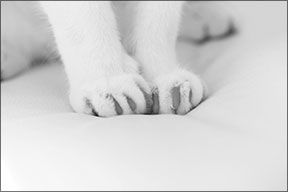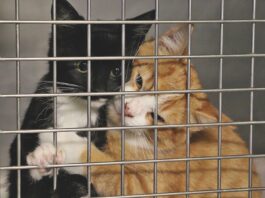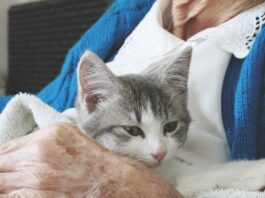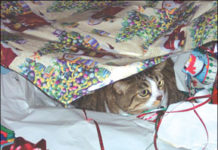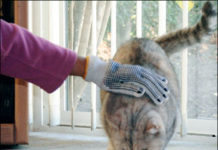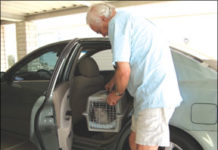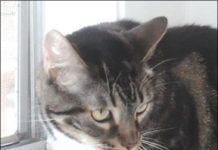Disaster Help: In the Wake of Hurricane Ike
As a result of Hurricane Ike, the Houston SPCA rescued more than 1800 animals; fed/watered 500 animals that were left in their homes by evacuating families; placed more than 450 pets in temporary foster homes, and celebrated nearly 400 miraculous reunions. Prior to Hurricane Ike making landfall, the Houston SPCA worked in concert with other area shelters: Dogs and cats were relocated from the Houston SPCA to shelters in outlying areas, so that dogs and cats from coastal shelters in danger of destruction could be moved to safety in Houston. In addition, the Houston SPCA coordinated evacuation efforts for owners in need of crates, carriers, muzzles, leashes and other travel items necessary to safely evacuate their beloved pets with them to shelters, hotels and other temporary living arrangements. The question remains, of course, why were so many pets left behind when owners had more than a week to prepare a safe evacuation? Under the Pets Evacuation and Transportation Standards (PETS) Act of 2006, state and local emergency preparedness authorities were required to accommodate households with pets or service animals in their evacuation plans. "The common reasons we heard [for leaving pets behind] were, We didnt think wed be gone so long, We left food on the table, or theyd say, We thought theyd be fine," relates Meera Nandlal, public relations manager for the Houston SPCA in Houston, Texas.
Teaching Your Old Cat New Tricks
We have all heard the popular phrases that support the notion that cats cannot be trained. Tee shirts remind us that "dogs come when called - while cats take a message and get back to us." When a dog is not particularly obedient, he is said to be "more like a cat than a dog." Yet we all know that cats are intelligent and quite capable of learning. In fact, people have successfully trained fruitflies and fish. Perhaps the misconception arose because old-fashioned training strategies which rely on coersion are generally ineffective when used on cats. On the other hand, reward-based training methods are both effective and fun. When an animal (even a cat) is rewarded for demonstrating a particular behavior, he will repeat the behavior in the future. That is the principle of positive reinforcement. A reward-based training technique requires that you find a reinforcer that is truly rewarding. What is your cats pleasure? Is there a treat so delectable that your cat would be willing to jump through a hoop, literally, just for a taste? Consider not only commercial cat treats, but fresh food instead. Morsels of meat, fish, cheese or even cantaloupe can be tested as potential reinforcers.
Ask Elizabeth: 12/08
I do believe that CatWatch readers are the most kind-hearted souls on earth! Thank you for wanting to help these little creatures. Its very common for female cats to bring home prey. Mother cats will first bring home dead animals to their young kittens, teaching them to eat prey animals. When the kittens are a bit older, the moms will bring home wounded animals, and will show the youngsters how to kill. Its possible that Marley is attempting to teach you how to hunt. The best thing that you can do when presented with an injured wild animal is to call a licensed wildlife rehabilitator for advice and assistance. Many well-meaning people are especially tempted to keep baby animals and care for them at home. Keeping wild animals - except to transport them to a wildlife rehabilitator - is against state and federal laws for lots of reasons. Many wild animals, even tiny babies, can transmit diseases to humans or other pets. Diseases, parasites or injuries may be difficult to detect and to treat, and each species requires specialized care.
The Danger of String
Brooke Remy of Boston, MA, was delighted to watch her cat Puddles play with a long, pink ribbon she had just taken off a gift box. He twirled around and around and rolled over on the floor. Brooke tired before Puddles did, and left the room for about five minutes. When she returned, the ribbon was gone - except for about two inches sticking out of Puddless mouth. He was coughing and drooling. Running over to him, Brooke began slowly pulling the ribbon out of his mouth, watching in terror and amazement as she removed eight inches of wet pink ribbon from his throat. Puddles was lucky that Brooke had returned in time. If he had swallowed the ribbon without Brookes quick intervention, he could have suffered very serious, even life-threatening, damage to his intestinal tract.
Ask Elizabeth: 11/08
Dear Elizabeth: I adopted a cat from a local animal shelter three years ago. She is a beautiful brown tabby girl who loves to help when Im working at my desk. The trouble is that she sneezes green goobers all over my paperwork. When I brought her home she had a runny nose and goopy eyes with a lot of sneezing - a classic cat cold according to my veterinarian. A week of antibiotics helped decrease the wet sneezes, but Tabitha has never really recovered from that early cold. Three years have gone by and she still sneezes thick goobers nearly every day. Although she seems happy, is active and eats well, her constant snuffling, congested breathing and spewing green goobers breaks my heart - and also has me frustrated. My veterinarian has done everything she can think of, from antibiotics for weeks on end to medication to help with Tabithas immune system. Everything seems to help … for a while. What tests can I ask for to find out exactly whats causing Tabithas sneezing?
Cleaning Secrets to Try
With three shorthaired and five longhaired cats, Debbie Salerno, chairperson of the board for Maine Coon Cat Rescue in Hazlet, NJ, knows all about cat hair. "I find hair on the steps, on the carpeted cat tree, in the carpet in the hallway, wafting across the floor, and settled into the corners [of rooms] and around the bottom of the furniture," she relates. When hair is not cleaned up, it tends to travel with Salerno to work: "The hair gets all over the furniture and then sticks to me, and it winds up in my car and sometimes in my office if I dont get it off." Admittedly, for some cat owners, wayward hair is not a big issue. For other owners, however, it is. "Cleanliness is a high priority for me," explains Bobbie Williams of Beavercreek, OH. Williams, a volunteer for Maine Coon Rescue, will be hosting a wedding in her home soon and has the hair of four cats (two longhaired and two short-haired) to contend with for this event.
Ask Elizabeth: 10/08
Its a sad fact of life that cats dont live nearly long enough for the humans who love them. While cloning Couscous isnt an option, I would encourage you to take lots of photos and videos of Couscous, so that these images can bring you comfort when shes no longer a part of your physical world. Take them now; dont delay, because you never know what tomorrow will bring. Afterwards, maybe you would like to do something to help other cats, in honor of Couscous. A donation to an organization aiding cats is a traditional way to honor the memory of a beloved cat (the Cornell Feline Health Center is very grateful for the many memorial gifts it receives). You could also volunteer with a local shelter or rescue group, socializing cats or taking photos of adoptable pets to put on a Web site or poster. Dropping off supplies at a shelter can make you feel like you have a direct connection to cats in need. Finally, please consider sharing your home and your heart with another cat. For sure, he or she wont be a clone of Couscous, but this unique individual will surely bring joy to your home as you discover exactly what makes him or her so special.
Ask Elizabeth: 09/08
Dear Elizabeth: We adopted a new kitten from a local rescue group last month and she is just perfect. Although she had been tested for the leukemia virus and FIV by the terrific group that saved her from the street, we took her to our veterinarian right away so that she could be examined before we introduced her to our two older cats. After a clean bill of health, we brought Bunny home and she has become part of the family. The problem is that before we scheduled her spay surgery, she came into heat. What a scene!
Your Cat’s Amazing Grace
If you asked Mother Nature, "What is the most athletic animal in the world?" She would most likely answer "the cat." If in doubt, watch your feline in perfect, graceful flight up the kitchen table to the inside of a cupboard - without touching a thing. Your cats agility and sense of balance is one of her most outstanding features. Heres how it works - and how it can go awry. Biologists say that cats havent changed for the past ten million years. "The big cats, such as lions, tigers and jaguars, and the small cats are almost identical in their agility and flexibility," explains Mark Lotz, panther biologist with the Florida Fish & Wildlife Conservation Commission. "If you watch cats hunt - large or small - they all possess the same skills of pouncing, stalking low to the ground and launching off at top speed to chase their prey."
Taking Felix on Vacation?
Thinking about going on a leisurely week-long auto trip? Good for you! Thinking about taking your cat along for the ride? Youd better think twice about that, advises Julia Albright, MA, DVM, a resident of animal behavior at Cornell Universitys College of Veterinary Medicine. Theres a good chance, she maintains, that your pet would just as soon stay at home while you and the rest of your family pull out of the driveway. "You might really want to take your cat along," says Dr. Albright, "and thats totally understandable. But I would recommend that you leave the animal at home unless it has already shown that it likes to travel and wont get stressed out by the experience -and I havent met very many of those cats. In general, cats dont do very well with change, and traveling for hours on end in the back seat of a car would certainly come under the heading of change." For owners who cant bear the idea of putting their cats in a kennel for a week or so or leaving them at home in the care of a neighbor or professional pet sitter, Dr. Albright has some words of advice.
The Beautiful Tabby
Without even seeing your cat, Joan Miller, vice-president of the Cat Fanciers Association, knows your cat is a tabby. Impossible, you say. My cat is a Persian. Or my cat is a plain black alley cat. How does Miller decide that your cat is a tabby? "Because all cats are tabbies, genetically speaking," explains Miller. "All cats have a pattern of stripes, blotches, spots or whorls. If they have the dominant gene, theyre called Agouti - and they show the tabby pattern. If they receive the recessive gene, theyre known as non-Agouti, and they will be a solid color with no pattern." However, you can often still see the tabby markings underneath as a ghost pattern. The next time you get the chance, look at a black cat in the sun. You should be able to see the hint of a tabby pattern. "This is a lot easier to see in kittens," says Miller.
Keeping Elderly and Their Cats Together
Mary Jones has been living in New York City with her housemate Alice for the past ten years. Mary and Alice are actually about the same age. Both want to stay together for as long as they can take care of each other. But Mary is an 80-year-old widow and Alice is an 11-year-old domestic shorthair. Marys eyes arent as good as they used to be, and her arthritis bothers her when she bends over. So she worries how she will keep on cleaning Alices litter box and carrying the heavy bag of cat food up the stairs. And she wonders what will happen to Alice if her beloved companion outlives her. Weve heard a lot over the past several years about how older people benefit both emotionally and physically from living with pets. The problem is this: As people get older, they often experience disabilities which may prevent them for fully caring for the pets they love. What can older people do?

